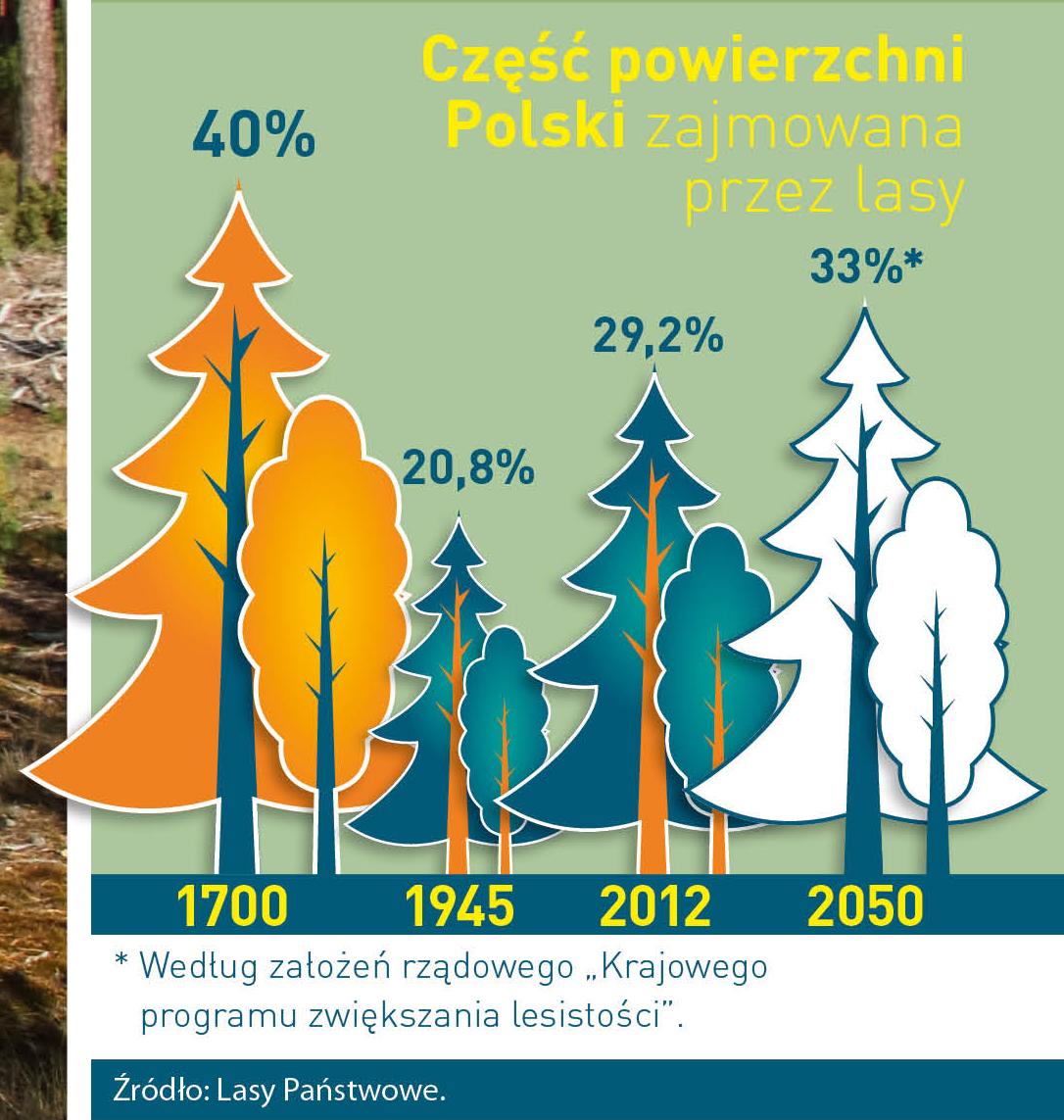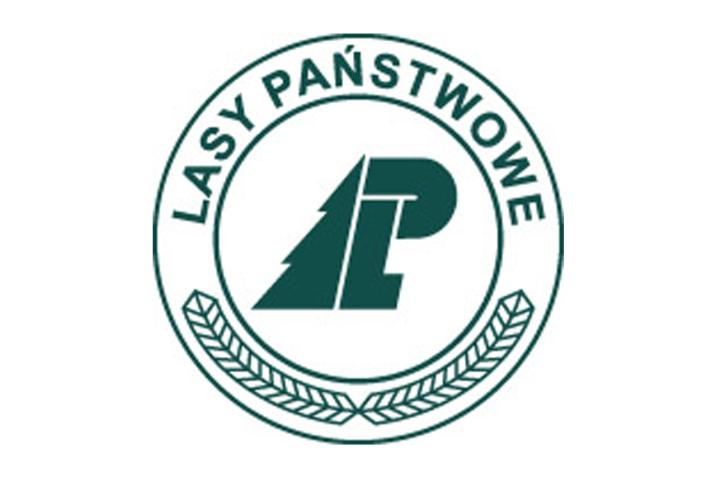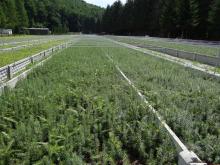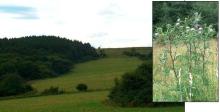 Asset Publisher
Asset Publisher
Polish forests
Poland is in the European lead, while concerning the area of all forests. They cover about 29,2 % of the country territory, and grow within the area of 9,1 million hectares. The overwhelming majority of the forests is state owned, of which almost 7,6 million hectares are managed by the State Forests National Forest Holding..
The number of Polish forest is still growing. The forestation rate of the country has increased from 21 % in 1945 to 29,2 % at the moment. Between 1995 and 2008, the forest area increased by 310 thousand ha. The basis for afforestation works is the "National Programme for Increasing the Forest Cover" (KPZL), assuming an increase of the forestation rate up to 30 % by 2020 and up to 33 % by 2050. Polish forests abound in flora, fauna and fungi. 65 % of the total number of animal species live there.
The forests grow in our country on poor soils, mainly because of the development of the agriculture in previous years. It influences the distribution of the types of the forest sites in Poland. Over 55 % of the forest areas is covered with coniferous forests. In other areas, there are forest sites, mainly the mixed ones. Their small part constitute alder and riparian forests – not more than 3 %.
In the years 1945 – 2011 the area of natural deciduous tree stands within the area of the State Forests National Forest Holding increased from 13 to 28,2 %.
Within the lowlands and uplands the most often occurring tee species is pine. It covers 64,3 % of the forest area of the State Forests National Forest Holding and 57,7 % of private and commune forests. In the mountains the predominant species is European spruce ( in the west) and European spruce with beech (in the east). Domination of pine is the result of carrying on sustainable forest management in the past. Once, the monocultures (crops or cultivations of one species) were the answer to the great demand of industry for wood. Such forests appeared to be quite fragile to climatic factors. They also were often the prey of pests' expansion.
In Polish forests, the share of other tree species, especially deciduous trees have been systematically increasing. The foresters have stepped aside from monocultures – that is why, they try to fit specific species of the forest stand to the natural stand, that would be proper for the given area. Thanks to that, in the years 1945 – 2011, the area of the deciduous tree stands within the lands of the State Forests National Forest Holding increased from 13 to 28,2 %. There occur more and more frequently the following tree species: oaks, ashes, maples, sycamore maples, elms, but also birches, beeches, alders, poplars, hornbeams, aspens, tilias and willows.
Our forests are the most often represented by the forest stands aged 40 to 80 years. The average age of the forest equals 60 years. More and more trees are of big size at the age over 80 years. Since the end of the Second World War, the forests' area has increased up to almost 1,85 million hectares.
Raport o stanie lasów w Polsce 2012
 Asset Publisher
Asset Publisher
INFORMACJA DOTYCZĄCA RODO
INFORMACJA DOTYCZĄCA RODO
POWIADOMIENIE o przetwarzaniu danych osobowych przez Nadleśnictwo Krasiczyn
Informacje na temat rekrutacji
1. Nadleśnictwo Krasiczyn z/s w Przemyślu informuje, że przyjmować będzie CV, tylko w przypadku prowadzenia rekrutacji na dane stanowisko.
2. Przesłane CV e-mailem lub listem poza prowadzeniem rekrutacji będzie, skutkowało zniszczeniem dokumentów.
Informacja na temat przetwarzania danych osobowych
1. Administratorem Danych Osobowych jest Nadleśnictwo Krasiczyn z/s w Przemyślu ul. 29-go listopada 12, 37-700 Przemyśl; e-mail: krasiczyn@krosno.lasy.gov.pl; tel: 16 670 66 56, reprezentowane przez Nadleśniczego Nadleśnictwa Krasiczyn Pana Przemysława Włodka.
2. Administrator Danych Osobowych dokonuje przetwarzania danych osobowych w celach związanych z działalnością Nadleśnictwa Krasiczyn tj:
a. prowadzenia statutowej działalności,
b. prowadzenia edukacji przyrodniczo-leśnej
c. spełniania obowiązku statystycznego,
d. realizacji zadań wynikających z Ustawy o Lasach z dnia 28.09.1991 r. ( Dz. U. z 2017r. poz. 788 ze zm.), w tym związanych z gospodarowaniem mienia stanowiącego własność Skarbu Państwa, zawieraniem umów dzierżawy, najmu itp.
3. Podmiotowi, którego dane są przetwarzane, przysługuje prawo dostępu do treści swoich danych, żądania ich sprostowania oraz usunięcia.
4. Dane osobowe będą przechowywane przez Nadleśnictwo Krasiczyn przez okres niezbędny do wykonania obowiązujących przepisów prawa.
INFORMACJA O MONITORINGU
w Nadleśnictwie Krasiczyn obejmujący Leśniczówkę Bełwin i część zabudowaną wiatami ścieżki edukacyjnej w Leśnictwie Wapowce.
Administratorem Danych Osobowych jest Nadleśnictwo Krasiczyn z/s w Przemyślu ul. 29-go Listopada 12, 37-700 Przemyśl, ( tel.16 670 66 56 ), e-mail: krasiczyn@krosno .lasy.gov.pl
Dane osobowe gromadzone w postaci wizerunku gromadzone przy pomocy monitoringu wizyjnego, przetwarzane są na podstawie art. 6 ust 1 lit. f Rozporządzenia Parlamentu Europejskiego i Rady (UE) 2016/679 z dnia 27 kwietnia 2016 roku w sprawie ochrony osób fizycznych w związku z przetwarzaniem danych osobowych i w sprawie swobodnego przepływu takich danych oraz uchylenia dyrektywy 95/46/WE (dalej jako RODO), gdzie przez uzasadniony interes administratora należy rozumieć chęć zapewnienia bezpieczeństwa osób i mienia oraz ochrony bezpieczeństwa i porządku publicznego.
Dane z zapisu mogą być ujawnione pracownikom lub współpracownikom Nadleśnictwa, podmiotom udzielającym wsparcia Nadleśnictwu na zasadzie zleconych usług i zgodnie z zawartymi umowami powierzenia oraz podmiotom uprawnionym na podstawie przepisów prawa. Dane osobowe związane z monitoringiem przechowywane są przez okres 30 dni.
Zainteresowany posiada prawo dostępu do treści swoich danych i ich sprostowania, usunięcia, ograniczenia przetwarzania, prawo do przenoszenia danych oraz prawo do wniesienia sprzeciwu wobec przetwarzania, a także prawo wniesienia skargi do Prezesa Urzędu Ochrony Danych Osobowych, gdy uzna, iż przetwarzanie jego danych osobowych narusza przepisy RODO. Przebywanie na terenie monitorowanym przez Nadleśnictwo Krasiczyn jest dobrowolne.


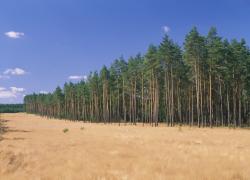 fot. Paweł Fabijański
fot. Paweł Fabijański
 fot. Paweł Fabijański
fot. Paweł Fabijański
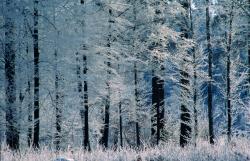 fot. Paweł Fabijański
fot. Paweł Fabijański
